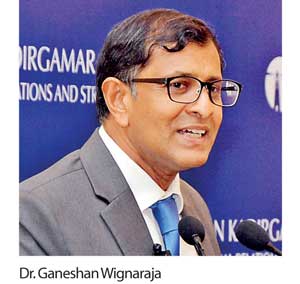03 Nov 2017 - {{hitsCtrl.values.hits}}
By Chandeepa Wettasinghe
The Free Trade Agreement (FTA) between China and Sri Lanka under negotiation is not economically motivated, and therefore Sri Lanka should get major concessions during the first ten years of the agreement, a top economist opined this week.

“My sense of it is that it is a political agreement. It’s not an economic agreement. You don’t negotiate with China if you’re a small country like we are,” Lakshman Kadiragamar Institute (LKI) Global Economy Programme Chair Dr. Ganeshan Wignaraja said. However, the government has in the recent past sought to make the China-Sri Lanka FTA palatable to the public by stating it is economically advantageous for Sri Lanka to have access to China in return for Chinese investments in Sri Lanka to take advantage of the country’s proposed preferential trade access network.
Speaking during an interactive session after delivering the lecture titled ‘A Recovering Global Economy? The Dynamics of China and India in the Future of Global Growth,’ held at the LKI, Dr. Wignaraja said that Sri Lanka should enjoy an ‘Everything But Arms’ status when entering Chinese markets under the proposed FTA for 10 years, during which China will not have preferential access to Sri Lanka.
“And I hope that’s what is being discussed— a lot of special and differential treatment plus trade adjustment,” he said.
Sri Lanka and China have been negotiating the FTA for over three years.
Some trade economists argue that all trade agreements are political agreement, while others argue that trade agreements are protectionist agreements.
For example, most trade between India and Sri Lanka takes place outside the Indo-Lanka FTA, although, most Sri Lankan exports to India take place in the FTA subjected to conditions, hinting at both protective and geo-political elements in the agreement.
Even without preferential treatment, China is the largest importer to Sri Lanka with US$4.22 billion, or 21.7 percent of the total imports to the country, growing from US$ 3.71 billion in 2015. Exports to China fell to US$211 million from US$ 308 million in the same period.
Sri Lanka’s exports to GDP had fallen over the last 16 years on account of complex bureaucratic processes, lack of export finance, and para tariffs that discourage global value chains, which researchers have advocated to fix before signing new FTAs, since these domestic barriers may render FTAs less effective.
Meanwhile, Dr. Wignaraja said that signing an FTA first with China is preferred compared to a deal with India.
Sri Lanka and India are negotiating economic and technology cooperation pact to deepen the existing FTA but reports had said that Indian officials had not viewed positively the attempts to correct weaknesses in the current FTA.
“If we can get an agreement with China, I think we can get an agreement with India rather quickly for obvious reasons,” Dr. Wignaraja said.
Economists have pointed out that balancing the two giants while getting the benefits from these relationships will be key for Sri Lanka’s economic growth.
28 Sep 2024 2 hours ago
28 Sep 2024 2 hours ago
28 Sep 2024 4 hours ago
28 Sep 2024 6 hours ago